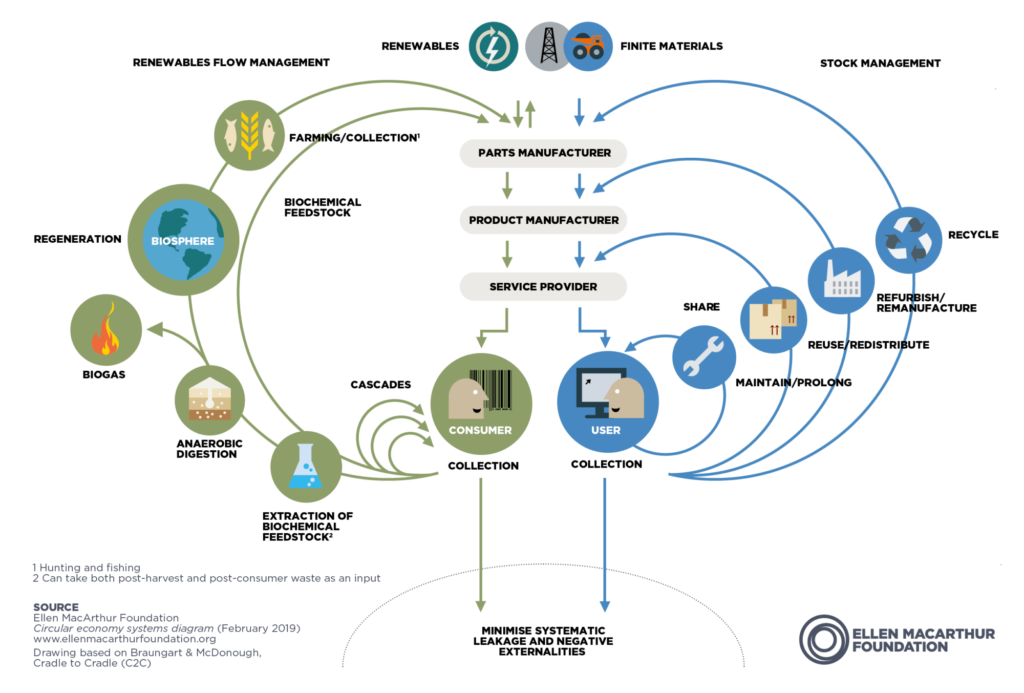The circular economy is one of the most intuitive concepts to life on earth. From the water cycle to the nitrogen cycle, nature is replete with self-sustaining processes that convert one organism’s waste into another’s treasure.
Humans, however, are unique in our ability to generate substantial waste that does not feed into a regenerative cycle but rather festers as pollution. From rusty shopping carts to abandoned plastic toys, the products of our linear “take-make-waste” model have piled up in our polluted oceans, overflowing landfills, and littered streets.
Veering away from the unsustainable consumption of non-renewable resources, the circular economy embraces three foundational principles: Design out waste and pollution, keep products and materials in use, and regenerate natural systems. The circular economy operates in two distinct categories: biological materials and technical materials. Biological materials, like food and paper, biodegrade and can be safely reintroduced into the natural world, whereas technical materials, like plastic and metal, cannot safely re-enter the natural environment and must be recycled, refurbished, reused, or maintained.

While individual businesses’ actions are important, a true circular economy cannot be accomplished without a systemic overhaul of our current linear model. The circular economy extends beyond recycling, encompassing a bigger picture in which durability is prioritized and products are designed to extract minimal resources. From rental clothing services to regenerative food production, the circular model is ripe for innovation across a wide variety of industries. Here are several companies experimenting with circular possibilities to up your sustainable shopping habits:
Cleaning Supplies
Blueland– Cleaning is a non-negotiable human need, but all too often, our cleaning products come in single-use plastic containers that contribute to a dirtier planet. Blueland cuts the waste out of cleaning by pairing highly durable and refillable Forever Bottles, Shakers, and Tins with highly effective cleaning tablets and powders that turn into a wide variety of cleaning products, including hand soap, dish soap, laundry detergent, and multi-surface cleaner, once dissolved in water. Forever Bottles, along with refill pouches and wrappers, are either recyclable or compostable. ($16 for Multi-Surface Starter Set)
Portable Solar Panels
Grouphug– Grouphug makes going solar stylish and accessible, even for those of us living in cramped shoebox apartments. The beautifully designed Window Solar Charger hangs on your window with a fuss-free suction cup hook and comes with a built-in USB port for charging small portable electronic devices, like your phone or your Airpods. The rechargeable battery stores solar energy for convenient charging, and the solar panels are made with a modular design that makes it easy to repair parts without having to trash the whole panel, which is rated to last over 25 years. Grouphug represents a step away from linear fossil fuel-derived energy towards circular solar power. ($149 for Window Solar Charger)
Shoes
Rothy’s- Styled by the Duchess of Sussex, Meghan Markle herself, Rothy’s flats bring a royal flair to sustainable fashion. Crafted from repurposed plastic water bottles, Rothy’s iconic flats are constructed using 3D knitting technology to minimize waste. Designed for maximum durability, Rothy’s can be popped in the wash for a quick and easy touch-up. Not only does Rothy’s offset carbon emissions, but they also deliver your shoes in a 100% recyclable box with fully biodegradable carbon inserts. ($125 for The Flat)
- Carbon Farming: The Future of American Agriculture and Carbon Trading - May 26, 2021
- LEED: Greenwashing or Good for the Planet? - March 8, 2021
- Who Invented Zero Waste? Acknowledging Indigenous Wisdom in Modern Environmental Practices - February 9, 2021
